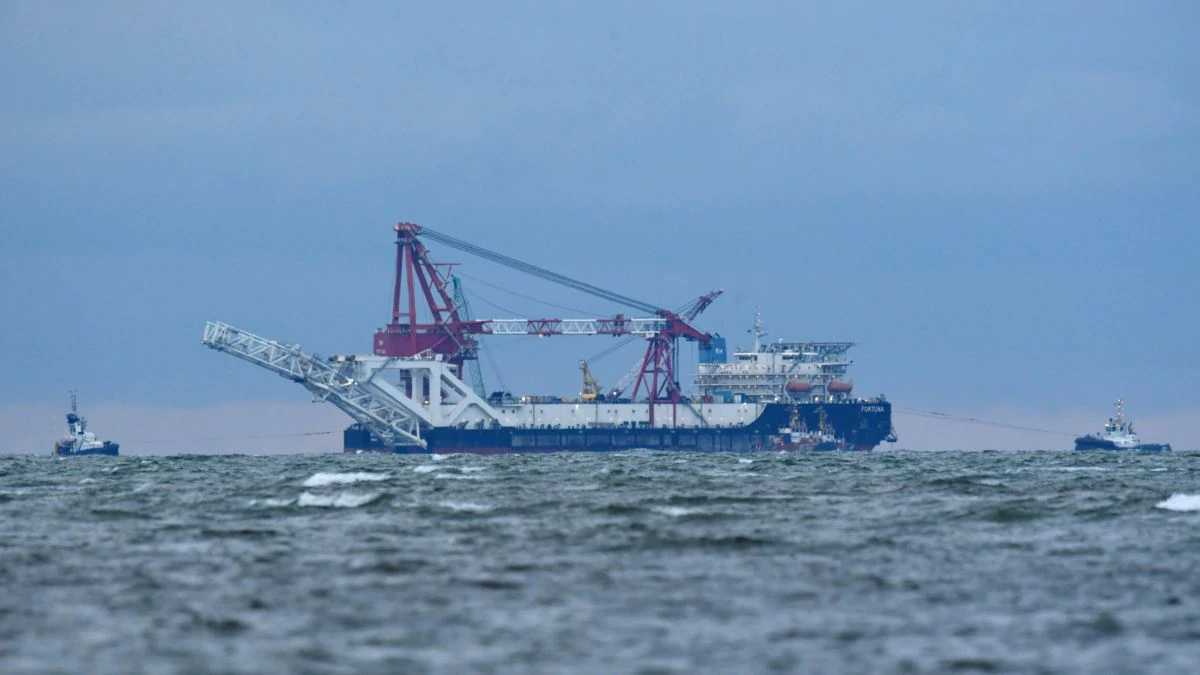
The United States has imposed sanctions on a Russian vessel in a bid to stop completion of the controversial Nord Stream 2 pipeline from carrying Russian natural gas to Europe under the Baltic Sea.
The sanctions against the Russian pipe-laying ship Fortuna and its owner, KVT-RUS, is a departing salvo against Nord Stream 2 as President Donald Trump leaves office after hotly contesting the pipeline.
The U.S. government and several EU members want to prevent the pipeline from being completed, saying it will strengthen Russia’s energy hold on Europe and undercut Ukraine’s role as a transit country for Russian gas.
“Nord Stream 2, if completed, would give Russia the means to completely bypass Ukraine, depriving Ukraine of vital revenues and opening it up to further Russian aggressive actions, while providing the means to use natural resources as a tool of political pressure and malign influence against western Europe,” Secretary of State Mike Pompeo said in a statement.
“Today’s announcement demonstrates that the United States is not afraid to hold accountable those who continue to aid and abet this tool of Russian coercion,” he added.
President-elect Joe Biden, who will replace Trump on January 20, has opposed Nord Stream 2 but also seeks to rebuild ties with European allies participating in the project.
Antony Blinken, Biden’s nominee to be secretary of state, told his Senate confirmation hearing on January 19 that the incoming administration will also continue to oppose the construction of the Nord Stream 2 pipeline.
The pipeline, designed to double capacity of the existing undersea Nord Stream gas pipeline from Russia to Germany, has been a point of contention between Berlin and Washington.
Germany and Russia say the U.S. measures amount to illegal extraterritorial sanctions on commercial activity.
Kremlin spokesman Dmitry Peskov told news agency Interfax that Russia was planning “to continue the works for the completion of this project” despite any sanctions.
Germany, which wants to secure natural gas as it ends reliance on nuclear and coal-fired power plants during build-up of green energy infrastructure, said it was disappointed by the fresh sanctions.
The sanctions were leveled under the Countering America’s Adversaries Through Sanctions Act (CAATSA) and could be expanded under new sanctions provisions in the annual U.S. defense policy bill that went into effect this month.
The new sanctions law also provides for punitive measures against companies that dig trenches, insure ships, or provide them with port facilities. Earlier this week, the Norwegian certification company DNV GL confirmed it was withdrawing from the project due to the threat of U.S. sanctions.
It’s unclear what impact the sanctions will have as long as the Fortuna is outside of U.S. territorial waters. The German state of Mecklenburg-Vorpommern, where the German section of the pipeline connects, has established a special environmental foundation to shield companies from U.S. sanctions.
Fortuna left the German port city of Wismar on January 14 and moved in the direction of a construction zone near the Danish island of Bornholm.
The threat of U.S. sanctions forced a Switzerland-based pipe-laying company to suspend construction on Nord Stream 2 in December 2019 shortly before its completion.
Nord Stream 2, led by Russian gas giant Gazprom, had to bring in the Fortuna, which is moved or held in place by other vessels, hoping to skirt around the sanctions.
According to Gazprom, 94 percent of the pipeline has been completed. That leaves around 150 kilometers left — or 75 kilometers on each parallel line — of which 120 kilometers are in Danish waters and 30 kilometers in German waters.
Fortuna last finished a 2.6-kilometer section of each of the gas pipeline’s branches within Germany’s exclusive economic zone in December 2020, the first such resumption on the pipeline since it was suspended in late 2019.
With reporting by dpa, NDR, Reuters, TASS, and Tagesschau.